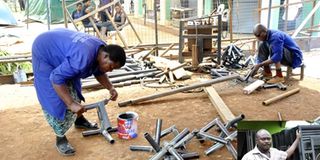Washing tents watered his business dream

Some of Luyima’s employees at work. Inset, Luyima at his workshop in Bweyogerere. Photos by Racheal Ajwang.
What you need to know:
Enterprise. “The success combination in business is: Do what you do better ... and: do more of what you do...” These are words of a wise man that Richard Luyima had in mind before he ventured into his business. He shares his story with Roland D. Nasasira.
For most years of his youth, Richard Luyima was a farmer in his home area of Kalisizo in Rakai District. He grew crops such as vanilla, coffee and maize for survival.
In 2006, through a long-time friend, Luyima found his way to Kampala after a fall in the market for his produce.
“My friend asked to bring me to Kampala to wash tarpaulins at his tent-making business. For my first three years in Kampala, I did this kind of work. After sometime, he trusted me and always sent me to buy material from dealers,” Luyima recalls.
After three years of learning how his friend ran his business, Luyima conceived the idea of starting up his own tent-making business. He pooled resources with a friend after selling his two rental houses in Kalisizo and together, they started up a separate business.
“We started working but along the way, I experienced a setback. The person that I had partnered with cheated me and said I had not contributed anything to start the business. I couldn’t fight with him for the enterprise and decided to retreat to the village,” Luyima says.
In the village, he went back to his small-scale farming. He grew crops such as yams, beans and maize. “I also baked bricks and when I supplemented it with the output from farming, I came back to Kampala with Shs960,000 in less than a year. I was determined to start up a business of my own without partnering with anyone because I never wanted to experience another setback. I started up Classic Tent Manufacturers,” Luyima explains. He started with 20 small camping tents, which he bought from Kikuubo in Kampala at Shs35,000 each and resold them at between Shs70,000 and Shs80,000.
From an area that has now attracted a number of developments, Luyima recalls that the time he opened his business in Bweyogerere on Jinja road, the place was bushy, with the house that he rented at Shs210,000 for three months as the only facility in the place. The rest were warehouses that stood quite a distance from each other. Though he was often scared by the then residents about thieves in the area, he persisted and established his business, approximately 200 meters from the main road.
Today, at his workshop, a number of activities go on. While some of Luyima’s employees are busy welding, others are cutting tarpaulins into the required measurements. Others are sewing the already measured and cut tarpaulins. They make bridal, car port, ordinary, camping and cake tents, among other types.
“Camping tents were an eye opener for my business because when I started the business, many people wanted them. The clients I would get would also recommend their friends and soon, my client base grew,” Luyima says, adding that this has enabled him open up two other branches; one on Gayaza Road in Kampala and a third one in his home town of Kalisizo in Rakai District that he named Classic Metal Works.
Achievements
From the tent-making business, he has not only been able to buy more land in Kalisizo on which he has planted more than 80,000 eucalyptus trees, but he has also built his family a house. He has also been able to employ more than 40 people, who have also acquired different technical skills.
Challenges
Though he currently offers internship placements for university students, the limited space at his workshop does not allow him to take on as many as he wishes. “The space where I operate is small space and I cannot take many students. I would want to expand but at the moment, I don’t have enough land to expand,” he says.
“Some clients don’t honour their debts. Someone can buy a tent at Shs20m, but when they pay Shs15m, they never turn up to clear the balance,” he laments, adding that some of his employees are not passionate about the business they run.
Future plans
Because business flows on well, with no specific time of the year when it is at its peak, Luyima says in five years’ time, he plans to open up a metal workshop school that will offer tent-making skills, and also provide, especially to the youth who never went to school, with employment opportunities. “I don’t like it when I see the youth having to travel to Kampala for technical education skills,” Luyima notes, adding: “Honesty and integrity have been key in growing my business. They are values that no one will teach you in any kind of business.”




